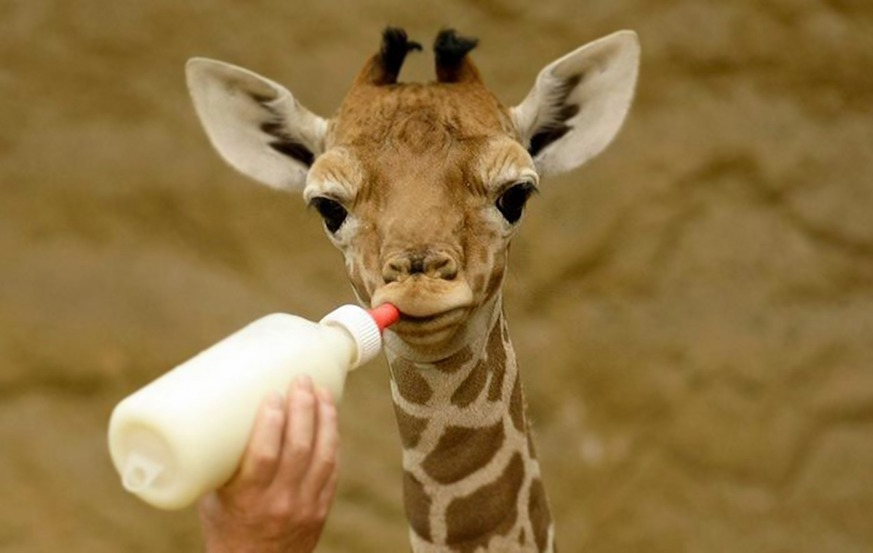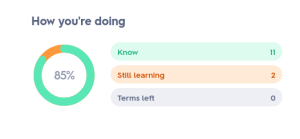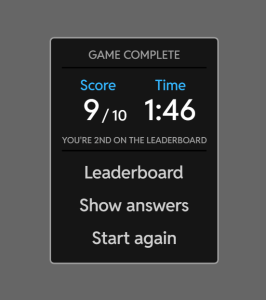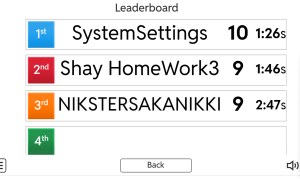Homework #5
Hebrew Homework #4
Hebrew Homework #3
Hebrew Homework #2
This is my 2nd Hebrew homework. It is about winter in Israel
זה שיעורי הבית העברי השני שלי. מדובר בחורף בישראל
הַחֹרֶף בְּיִשְׂרָאֵל
הַחֹרֶף בְּיִשְׂרָאֵל מַתְחִיל בְּדֶרֶךְ כְּלָל בְּחֹדֶשׁ דֵּצֶמְבֶּר, וְהוּא נִמְשַׁךְ כְּאַרְבָּעָה חֳדָשִׁים. בָּחֳדָשִׁים הָאֵלּוּ הַטֶּמְפֵּרָטוּרָה נְמוּכָה וְקַר בַּחוּץ. הָרוּחַ בַּחֹרֶף חֲזָקָה וְקָרָה, בַּשָּׁמַיִם יֵשׁ עֲנָנִים אֲפֹרִים וּשְׁחֹרִים, גֶּשֶׁם יוֹרֵד וְלִפְעָמִים יֵשׁ בְּרָקִים וּרְעָמִים.
מָה עוֹד קוֹרֶה בַּחֹרֶף בְּיִשְׂרָאֵל? פִּרְחֵי הַחֹרֶף פּוֹרְחִים, צִפּוֹרִים מֵאַרְצוֹת קָרוֹת מַגִּיעוֹת לְיִשְׂרָאֵל, חֵלֶק נִשְׁאָרוֹת כָּל הַחֹרֶף, וְחֵלֶק מַמְשִׁיכוֹת לָאֲרָצוֹת חַמּוֹת יוֹתֵר. הָאֲנָשִׁים לוֹבְשִׁים בַּחֹרֶף בְּגָדִים חַמִּים, הם מְחַמְּמִים אֶת הַבָּתִּים, וּבְיָמִים שֶׁל שֶׁמֶשׁ יוֹצְאִים לְטַיֵּל בַּשָּׂדוֹת הַפּוֹרְחִים.
_____________________________________________________________________
1. הָכִינוּ דִּיאַגְרָמָת וָאן (Van Diagram) וְעִמְדוּ עַל הַדְּבָרִים הַמְּשֻׁתָּפִים וְהַשּׁוֹנִים בֵּין הָחֳרֵף בְּקָנָדָה וְהַחֹרֶף בְּיִשְׂרָאֵל.
2. עִרְכוּ מֶחְקָר עַל פִּרְחֵי הָחֳרֵף בְּיִשְׂרָאֵל וּבָחֲרוּ פְּרָחִים מִתּוֹכָם וסַפְּרוּ עֲלֵיהֶם.

הַכַּלָּנִית הַמָּצוּי הִיא הַפֶּרַח הַלְּאֻמִּי שֶׁל יִשְׂרָאֵל .
כַּלָּנִית מְצוּיָה הִיא פֶּרַח אָדֹם שֶׁפּוֹרֵחַ בַּחֹרֶף בְּיִשְׂרָאֵל.
Ty for reading!
Hebrew Homework #1 / שִׁעוּרֵי בַּיִת בְּעִבְרִית מַס’ 1
This is a short paragraph about a baby giraffe in hebrew:
:זוֹ פִּסְקָה קְצָרָה עַל תִּינוֹק גִ’ירָפָה בְּעִבְרִית

זֶה גִ’ירָפָה תִּינֹקֶת.
הוּא הָחָבֵר שֶׁלִּי וַאֲנִי אוֹהֵב אוֹתוֹ.
הַגִּ’ירָפָה הַתִּינֹקֶת הַזּוֹ בֶּן 1.
הַגִּ’ירָפָה הַתִּינֹקֶת אוֹהֶבֶת תַּפּוּזִים וְתַפּוּחִים.
אֲנִי אוֹהֵב גִ’ירָפוֹת.
Innovation Day Reflection
Today, I would like to share my experiences from Innovation Day. During the research portion, I found it challenging to create my bibliography in MLA format. I tried various methods, including watching a YouTube video, but I still struggled. Ultimately, I sought help from a website called “EasyBib,” which provided me with the correct citation format I needed.
Finding a topic for my Innovation Day project was not particularly difficult. I chose to focus on the “ASD Emotion Teacher,” and the idea came to me naturally. I connect with this topic because I have autism spectrum disorder (ASD) myself. Being on the spectrum, I want to help kids and others who are similar to me.
I was surprised by the amount of work required for this project. I believe I could have improved the experimental portion. I feel that I did not include enough detail and effort in that aspect.
However, my display board looked stunning! It was bright and well-organized, and it really stood out like sunshine.

To conclude this project, I would like to say, that everyone did an awesome job doing this project! I was blown away by everyone’s hard work and determination!
Thank you for reading! :3
Meaningful Mitzvot
These are the 3 mitzvot that mean the most to me:
____________________
To give charity according to one’s means (Deut. 15:11)
“For there will never cease to be needy ones in your land, which is why I command you: open your hand to the poor and needy kin in your land.”
“כִּ֛י לֹא־יֶחְדַּ֥ל אֶבְי֖וֹן מִקֶּ֣רֶב הָאָ֑רֶץ עַל־כֵּ֞ן אָנֹכִ֤י מְצַוְּךָ֙ לֵאמֹ֔ר פָּ֠תֹ֠חַ תִּפְתַּ֨ח אֶת־יָדְךָ֜ לְאָחִ֧יךָ לַעֲנִיֶּ֛ךָ וּלְאֶבְיֹנְךָ֖ בְּאַרְצֶֽךָ׃”
I decided to focus on the wonderful mitzvah of giving tzedakah! This mitzvah resonates with me because it’s all about helping others in need. In Deut. 15:11, the Torah teaches us that Hashem commands us to give to the poor and needy. It involves donating to charity and supporting those struggling, such as the homeless. It brings me such joy to be able to help others! It can impact everyone’s lives because every dollar matters. This funding supports individuals in need and can help save lives!
____________________
| Shema (Deut. 6:7)
וְשִׁנַּנְתָּ֣ם לְבָנֶ֔יךָ וְדִבַּרְתָּ֖ בָּ֑ם בְּשִׁבְתְּךָ֤ בְּבֵיתֶ֙ךָ֙ וּבְלֶכְתְּךָ֣ בַדֶּ֔רֶךְ וּֽבְשׇׁכְבְּךָ֖ וּבְקוּמֶֽךָ”׃” “Impress them upon your children. Recite them when you stay at home and when you are away, when you lie down and when you get up.” Deuteronomy 6:7 tells us to recite the Shema, a key statement of faith in Judaism, every day. We should say it in the morning when we wake up and in the evening before we go to sleep. This practice helps us remember our beliefs and stay aware of God’s presence in our daily lives. Reciting the Shema at these times strengthens our connection to our faith as we begin and end each day.
|
| To give charity according to one’s means (Deut. 15:11)
I decided to focus on the wonderful mitzvah of giving tzedakah! This mitzvah resonates with me because it’s all about helping others in need. It involves donating to charity and supporting those struggling, such as the homeless. It brings me such joy to be able to help others! It can impact everyone’s lives because each dollar counts! This money goes to people who don’t have enough money, Impacting their lives and giving them a better chance. |
Thank you for reading my blog post! See you in the next one!
Goal Reflection (1st Term)
Hi there! In this blog post, I’ll be reflecting on the goals I’ve achieved this term and where I am at with them.
_________________________
Hebrew
I’ve been on a journey with Hebrew, but I must admit, I’m finding it a bit challenging when it comes to speaking and understanding the language. I am still trying though. I am working really har, and if I keep trying, I’ll surely achieve this goal
_________________________
French
I’m feeling incredibly confident with my French skills! I’ve been speaking the language more frequently, and it’s amazing how much deeper my understanding has become. Each conversation feels like another step toward fluency, and I can’t wait to keep progressing!
_________________________
Time Management
I feel strong, confident and ready when it comes to time management! I complete tasks or assignments on time and have spent a reasonable amount of time on homework each day.
_________________________
Organization
Let’s talk organization! Cleaning a bit of my room every day has not been a breeze! Although I am still working on organizational skills at home by cleaning my room, I have also become very organized when it comes to school and studying.
________________________
Summary
This first term has been very exciting! I think to improve all of my goals, I have to keep trying! In french, I will speak more often and practise some of my other skills on Duolingo. In Hebrew, I think I need to start speaking in Hebrew for 10 minutes a day instead of 5. For my study skills goals, I will not change my practise plan.
________________________
Thank you so much for reading my blog post! I work really hard to make everyone pleased and entertained/engaged. I’ll see you in the next one!
________________________
Winter Musical – Mystery Macabeat
In class, we were assigned to make an overview of a musical about our winter break. Here it is! :
Mystery Macabeat – A Musical
This musical is about the night of the Mystery Macabee. Before the winter break, we had the idea of doing Mystery Macabee, which is Secret Santa, but Jewish. Everyone picked out a name, we all made sure that we didn’t pick our name. We weren’t allowed to pick our name. Once everyone had a card without their name, the timer would start. We would have one month to get a Mystery Macabee present. No one would know who was getting their present until the end. On the 2nd night of Chanukah, we would find out.
It was time on the 2nd night of Chanukah, a cold and snowy night. It was time to find out. There were a variety of presents, big and small, but all special. We got the presents by age. Maayan got a glow-in-the-dark bath bomb kit, and Gila got a fidget pen that you can reconstruct, build, and fidget with. Shayna got a giraffe blanket, Tehila got a watercolour kit, Abba got a scarf, Mom got a floating pen, and Bubby got a Teddy bear.
- Glow-in-the-dark bath bomb kit = Mom
- Fidget pen = Abba
- Giraffe Blanket = Bubby
- Watercolour = Shayna
- Floating pen = Tehila
- Scarf = Gila
- Teddy bear = Maayan
Shayna, Liora, Daniel, Sandy, Gila, Tehila, Maayan
____________________________________________________________________
We also had to make a list of songs and describe each one and what they are about:
____________________________________________________________________
Song List:
- Needy Winter
All of the girls in the house are struggling with ideas for presents.
- Pays a price
-
- The Kids are making/getting their presents, thinking about the time limit.
- The Night I Saw Candles
- The night of the Mystery Macabee, when everyone is lighting candles, dancing, and spending time together.
________________________________________________________________
Time to write! Each one of us had to make one of our songs from the list we made!
_______________________________________________________________
The Night I Saw Candles
It’ll be a night of joy and light, gathered around, hearts shining bright. Sharing laughter, love, and cheer, creating memories year after year. With each flicker, dreams take flight, in the warmth of togetherness, we ignite! So here’s to the magic, pure and true, on this perfect night, I’ll celebrate with you…
On the night I saw candles, burning bright! During the day, and through the night! I will burn bright, and high, when I share this night with you, looking eye to eye, on the night I saw candles! Side by side, I hope you’re ready to go for a ride.
Stars glimmering in the sky, sitting at the table, the one time we are able to be together I don’t know what’s better, It! was:
On the night I saw candles, burning bright! During the day, and through the night! I will burn bright, and high, when I share this night with you, looking eye to eye, on the night I saw candles! Side by side, I hope you’re ready to go for a ride.
It’s~ (It’s!)
On the night we saw candles! Burning so bright!
It might as well not be the night! Sitting together side by side, eye to eye, together we ignite~!
[Music while holding hands (still holding high note)]
It’ll be a night of joy and light, gathered around, hearts shining bright. Sharing laughter, love, and cheer, creating memories year after year. With each flicker, dreams take flight, in the warmth of togetherness, we ignite! So here’s to the magic, pure and true, on this perfect night, I’ll celebrate with you…
On the night I saw candles~!




